Mismatched Socks
by Michael Bevilacqua
Feb 2011
Since Nevzorov Haute Ecole (NHE) is mentioned in the book as part of my experience, it has also raised a lot of questions. NHE was created by Alexander Nevzorov and his wife, Lydia Nevzorova. Their research has raised the horse to a new level achieved without force, bits, spurs, whips. This article is to help clarify some misconceptions about NHE and I do so from the experience along with Lydia and Alexander's journey from 2004. It also addresses common questions or problems that I saw surface or heard about from the NHE forum/school.
There have been a lot of comments or questions about what to do with the horse. That may sound strange but a large part of the reason for such concerns has been since Alexander Nevzorov no longer advocates riding. From earlier articles or from within the forum you may have heard the question, ‘Were horses created for riding?’. The answer to that question is 99% No. Of course, that direct question aside, it also follows that people really think, ‘What else is a horse for?’ This part of the article is not an argument about riding or not but about the results of the reflection from people resulting from that question. Believe it or not, knowing that horses should not be ridden has been known for a long time. Present-day articles from vets mention it, but then, since we ride anyway, they go on to describe the best saddle fit or we hear of massage techniques or pharmaceuticals to get rid of the symptoms of underlying problems that we cause in the first place. That is the simple reality that people cannot bear to hear or believe.
Being passionate about Haute Ecole (most elaborate and specialized form of dressage) it was Alexander's initial objective to be able to ride but without all the painful, controlling gear. Although he achieved it, believing that natural collection was powerful enough to protect the horse from damage changed. Every step along the way brought a new question which led to further adjustments in his thinking to reduce riding time. Ultimately, riding had to cease altogether. Sitting on a fit horse, even in natural collection, will inevitably still cause ischemia. This is the first and only one of the problems caused by long-term riding. It is when the blood supply to the tissues in the saddle area is compromised, leading to tissue damage and tissue death. An excellent fitting saddle could give a subcutaneous pressure of 1.93 psi. This well exceeds the highest pressure found in the arterial capillary bed of 0.75 psi. A simple example is pressing on your skin and the spot turns white (no blood flow) or crossing your legs and one 'falls asleep' or goes numb. Alexander is not the first person to mention it, but he is the first person that I know who actually publicly stands by the horses he loves.
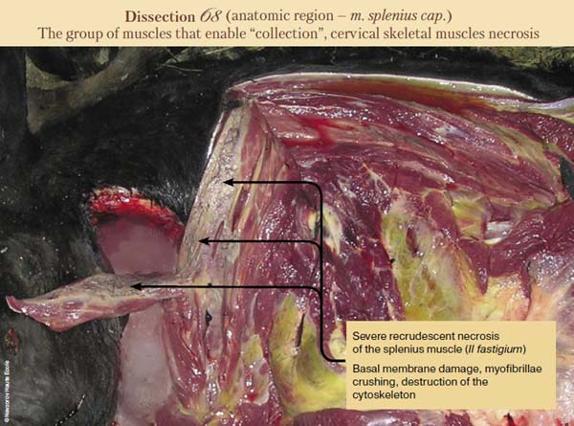
At the beginning, pursuing Haute Ecole was not something that I had considered but the exercises became more fun as the horses progressed. It was also a very good way to enhance the relationship and comprehension between us. They built strength, would consciously go into natural collection and doing so more often at play. As Xenophon once said, "A horse is such a thing of beauty; None will tire of looking at him as long as he displays himself in his splendor."
A turning point for the worse in the popularity of NHE was due to a statement from Alexander in the School Tractate series. He explained his view that horses should not be kept in a herd because they become stupid. Actually the real problem is that he did not fully explain that statement. People reeled in shock. Despite what people had learned about NHE, what attracted them, how they saw and read so much about what we do with horses, that one sentence changed their entire outlook of NHE.
Not many stopped to think, “That doesn't make sense coming from Alexander. What does he mean by that?”.
It led to an exodus of forum members and, even some representatives, who believed that Alexander isolated his horses and kept them no better than stabled sport horses. The crudeness or vagueness of that sentence, with little explanation about what he meant by ‘herd’ or ‘stupid’ certainly had many among the barefoot crowd in an uproar. It was just at the time that a more natural lifestyle for the horse was taking hold; many people were learning to hoof trim their own horses and horses being outdoors with freedom of movement was becoming mainstream. He is not talking about a group of domesticated horses in your backyard. He means a real herd. In a wild herd horses will draw upon other intelligence for survival alone. It is going back to instinct without any other learning or care in a domesticated environment from any human.
Lydia in 2008 after Praefatio became public:
"There is not strict rule how to keep horses in the school!!!!!! Our horses are outside 24/7 (rugs are for Russian climate where horses of our breeds should not live). Small groups are very good!!!!! and its not a herd! Food should be available permanently. Care for injuries and cold, hoof trimming and care about insects etc. Everything for horses comfort should be done, so horses can devote most of its time to study and developing, not for searching food and trembling due to cold."
It was too late. Even today someone asking me for help about changing the way of being with horses to create an understanding relationship may raise a question about Alexander's statement because they picked it up from another forum. Something along the lines of, "Oh, glad to hear that you don't isolate your horses anymore". Never did. Never will. This is all about respect for the horse, health, living conditions, freedom of movement, food, water, attention and constant care. It also depends on circumstances, space available and how your horses get along. Thankfully, I have not heard from anyone or about anyone who literally adhered to the propagation of that misinterpretation about keeping every horse separated.
The desires of people about what they wanted from NHE varied. This continued as NHE evolved. The now defunct forum was also considered a school. What a lot of people do not realize is that it was Alexander's personal journey of discovery and he took us along with him. We were there when he came to some understandings and then realizations that he had to change some recent belief. It was evolving with his analytical view, empathy and later to scientific proof relating to detrimental previous standards of horse use.
Alexander explained in his book, The Horse Crucified and Risen, that working alone with a horse, with no distractions, is what he found to be the most effective and quickest way to developing any physical or intellectual aspect of the horse. He said that even being outside alone with a horse was not perfect because of distractions from anything outside such as a fly on the horse's belly. Lydia also explained that this was Alexander's personal experience and is not a rule.
Alexander worked with one horse at a time in the manege often with only the sound of a metronome for focus on timing (despite the pigeons).
Many people do not have a quiet manege to work in but many people around the world still succeeded with their horses with only a field to stand in. Alexander joyfully recognized these achievements and gave personal guidance.
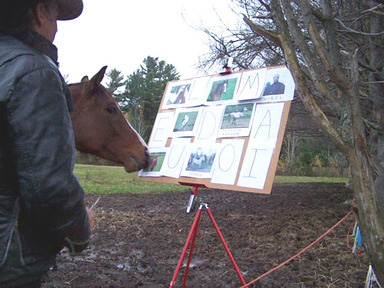
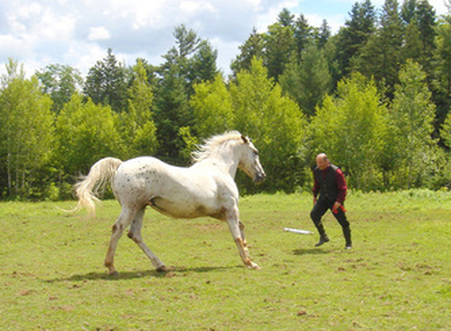
Intellectual capability and playfulness in horses are highly underrated by most people
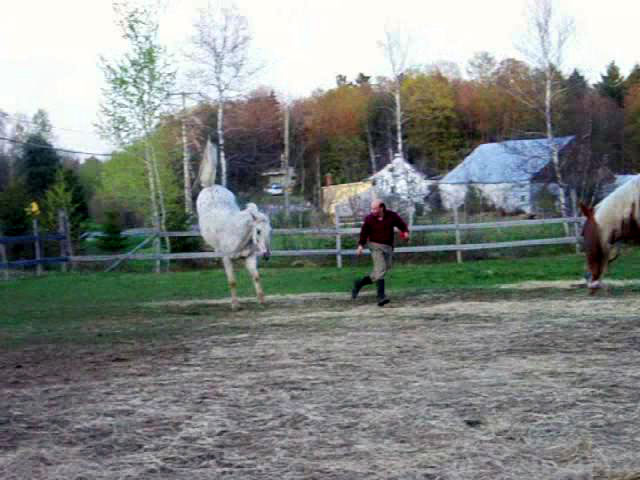
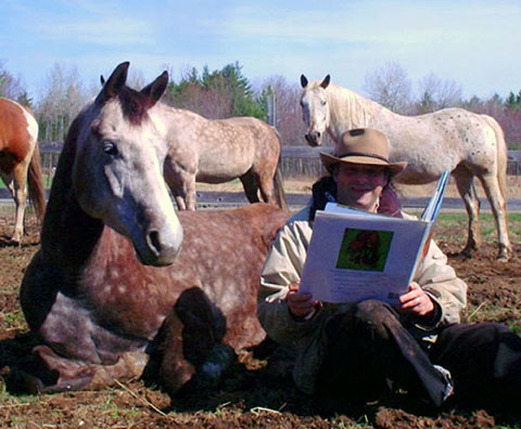
While working with a horse you should be free from distractions or interruptions. Other horses must learn to stay back and wait their turn
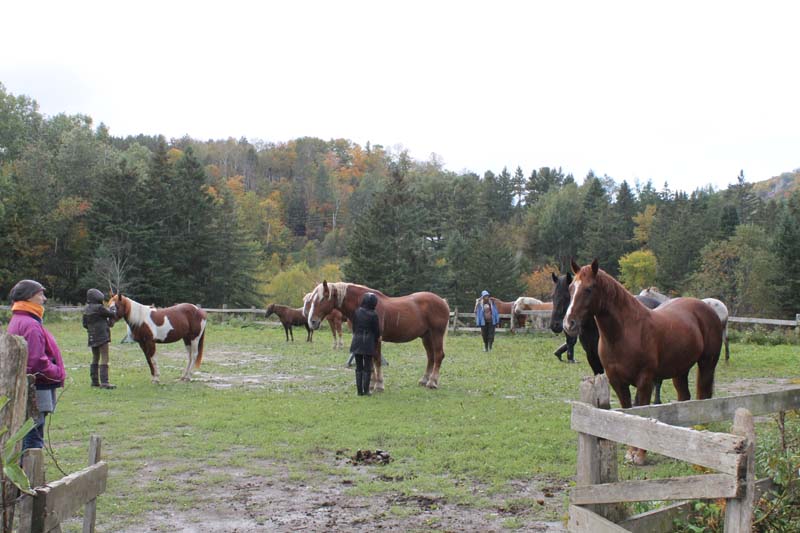
Participants at an International Seminar got horses' curiosity and attention after only one day. Free choice and respect are crucial.
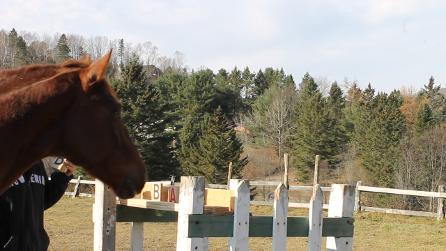
Aside from learning letters to spell words horses can learn to identify entire words such as 'hot' and 'cold'. Always useful.
Do I have individual box stalls for my horses? Yes I do for when they are needed. At the very beginning of the sweeping change in the horse world about freedom of movement, we learned that the drastic swing of the pendulum from standard stabling to 24/7 freedom was not the best or wisest choice.
When it gets frigid here, I saw the horses’ reactions. Being outside more, they acclimated to the dropping temperature. They hold up pretty well to cold with their thicker hair coat but even blankets do not always do a sufficient job. A couple of things came to my attention not from my own beliefs but by really looking at the horses. In the morning, I might find one horse separated from the others. He was standing still even as I spread out the first hay of the day. When he walked it was slowly and with stiff, short strides. The look on his face simply did not sit well with me. When it was very cold, they would huddle and barely move for hours on end. Their hooves are packed in ice around the clock. Sure they survive, but could it be unpleasant? Could it be dangerous? The horses showed me yes. If there is a frigid air mass moving in and/or high arctic winds or freezing rain, I get them inside.
The very expensive big box or shelter is prepared with a thick layer of shavings over rubber mats. Heating would only be for my convenience, so the horses do not undergo drastic temperature changes. However, the ground surface changes and they are protected instead of just surviving the night or trying to keep warm by huddling against each other out in the open. If they can come and go as they please, why were there horses outside frozen stiff? Because one dominant horse was standing in the doorway. I bring them in, by just signaling, and they each go into their own space. Standing on an unfrozen surface, I see their facial expression change. I see them move about normally, even lay down. Believe me, if they wanted to get out they would. They developed analytical skills. They can open doors, untie, unlock, disassemble, find a weak spot, crawl under or jump over just about anything that may serve to confine them. Some may say I am anthropomorphizing about the cold. As a child, I remember my mother telling me to put on a sweater because she was cold. Been there, done that. Now I am listening to the horses with my eyes. Lydia helped me to observe, think with logic and not preconceived notions.
Coming back to NHE, when people say that they just love NHE it is because they all see something different that affects them the way they like. Many other things are simply overlooked. Was not this type of scenario or lifestyle circumstance for horses mentioned in the very first film by Alexander? Yes, it was. It was about bringing horses in from the wild. I am not preaching to anyone. I do strongly insist, however, that any horse owner should listen to that little doubt that surfaces or strangeness that they note in their horses.
Lydia often mentioned the fluidity within the journey, both on the forum and in magazine interviews. She refered to Praefatio again within the forum and the difference between domesticated horses and wild herds:
“People can do what they think is right in horse management, except bits, shoes and stabling. Herds are NOT groups of horses. The rules in this article are not obligatory, it is only advice of person who has result. It is much easier to teach the horse to whom you have contact every day and who lives at your home. Nothing more. Alexander is not against such life of horses like people in international School have! But you also keep the horses in groups which you have created, without possibility for horses to choose friends, have sex, or foals. You have the fence around, bigger or smaller place, but you have a fence. One horse can become member of the family, but it is much better to have two or three. The term herd is problem as it seems... Alexander has many ideas and thoughts and later it can be transformed anyway... Not static.” - LN
She also debunks the 'isolation' rule in their magazine, Nevzorov Haute Ecole Equine Anthology Vol. 7 (pg.70) and also in Vol. 9 (pg.66) Extract from Vol 7: Interviewer Maria Sotnikova: Alexander's articles sometimes are difficult to comprehend - real life is entwined with historical literature, which provokes rumors such as NHE allegedly insisting on closing horses in stables, for example. I know that it's not the truth but I'd like to hear your opinions.
Lydia Nevzorova - "Regarding 'closing in the box', it was not Alexander's idea, it was a recommendation of Pluvinel and other old masters! But do not forget that the same masters rode horses with terrible bits, trained in pillars etc. We already proved that all this is nonsense and it contradicts all laws of physiology."
Alexander further reiterates Lydia's words in an interview from 2011 after the completion of the film L.E.P.: Q: And one more thing. In one of your treatises written in 2007, you mention Pluvinel's recommendation concerning the isolation of horses educated in Haute École. Is this still the case?
Alexander: "It would be good to know that since Pluvinel's time the method has been polished, but no one cared about the health and comfort of the horse as we do now. Pluvinel himself rode, used the bit, the spurs, the pillars. He never thought the horse needed help. In the beginning, we relied on the old masters, but time has passed and we are now leaving behind everything that is not suitable and reasonable today. We have abandoned the use of the bit and the tools of coercion necessary for the infliction of pain. We gave up the exercise of raised airs, and later gave up riding. In combination with this development, we have proven that there is no need to continue isolating one's horse. So today, in the year 2011, I can say with certainty that it is foolish to follow the commandments of the old masters regarding this aspect. The school grew and today there is not much left of the old Haute École."
There is a rule about not having electric fences, but Lydia understands full well that outside of Russia, such fences for (large) domesticated animals are often obligatory by law. This type of law is to prevent escaped stray animals getting injured on roads, train tracks, causing motor vehicle accidents, human injuries and deaths, as well. High tensile wire (solid metal wire) is not suitable for horses due to its strength and risk of entanglement. However, most horses, or other animals, who know an electric fence once will never touch it again. Some people will still construct a wooden fence but, to comply with local laws, set up an electric fence on the outside of the wooden fence. Wide, highly visible ribbon spliced together in short, breakable sections is best. In many areas, it is not so much to keep horses in but to keep other predator animals out.
The final word regarding horsekeeping, after all of NHE's questioning and research, is from Lydia in her book Paddocks and Shelters, available on Amazon. She clearly and logically gives different examples of how to keep horses for different situations. It touches on stallions, mares, geldings, friends, outcasts, changing hierarchy within the group of horses or even the extreme of needing separate paddocks for two horses that quarrel and fight all the time.
The welfare of the horse is the most important factor in NHE. Short articles or references to a single sentence should be viewed in perspective with the overall information.
It is incredible how some simple topics, even one sentence, can become so convoluted.
It sometimes is like holding a press conference to announce the cure for cancer. However, what subsequently appears on the television and newsprint is how my socks were mismatched.
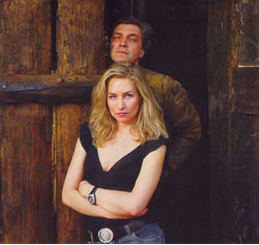
Lydia Nevzorova & Alexander Nevzorov